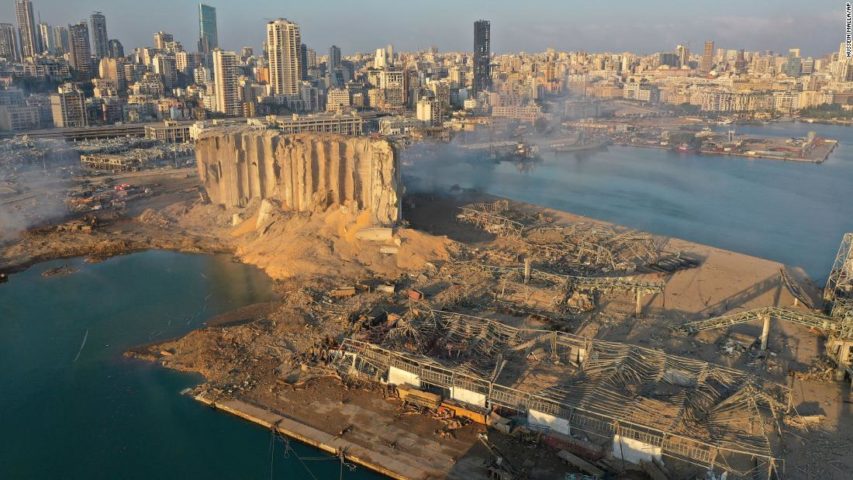Kareem Shaheen, who lived and worked in Beirut for some years, reports on the devastation and the ongoing debate over causes and responsibility:

Part of a photo gallery posted by CNN shows the site of the explosion in Beirut harbour. Note the massive grain elevator structure has been partly demolished, but the buildings on the other side almost certainly suffered far less damage for being in the blast shadow of such a massive concrete shield.
Photo gallery – https://www.cnn.com/2020/08/05/world/satellite-images-beirut-explosion-before-after-trnd/index.html
The Lebanese prime minister and security officials said the explosion was likely caused by a 2,700 tons of highly explosive ammonium nitrate that had been abandoned in the port. By comparison, the Oklahoma City bombing was about 2.2 tons of the same substance.
Reports indicate that the ammonium nitrate had been seized years ago, and knowing Lebanon, it was left there either out of negligence, or because the self-interested ruling classes of the country — a mafia in its own right — could not agree on how to divvy up the profits from the stuff.
Naturally, America’s arsonist and conspiracy theorist in chief, Donald Trump, speculated in a press conference that the explosion looked like a bomb. His generals told journalists, anonymously, that they had no idea what he was talking about.
But in a country already on the verge of collapse, the damage of this speculation was done. Conspiracy theories are now rampant.
Donald Trump’s comment may have been ill-informed, but the conspiracy theorists — along with anyone who thinks they know anything about explosives — were busy spinning pet theories regardless of what he said.
One that made the rounds seized on a tweet by Israeli Prime Minister Benjamin Netanyahu about a raid on pro-Iranian targets in Syria, and linked it to the Beirut explosion. The terrible size of the explosion prompted fears that it was a tactical nuclear strike. Independent Arabia — which licenses the British Independent newspaper brand and is owned by a Saudi Arabian publisher — reported, falsely, that the Canadian embassy said that the explosion’s fallout contained depleted uranium. Another media organization linked to the Lebanese president’s party claimed the explosive material was bound for terrorist groups in Syria.
The explosion could not have come at a worse time. Even before the blast, Lebanon was a failed state. Over most of the past year, it has suffered hyperinflation akin to the crisis in Venezuela.
Lebanon endured a 15-year civil war that ended in 1990 with an accord that divided power equally among its various religions and sects, while ensuring no accountability for the warlords who reigned over militias that carried out atrocities.
Many of these warlords, or their sons, are still in charge, and have built corrupt patronage networks to enrich themselves and their loyalists. Most are beholden to outside powers like Iran and Saudi Arabia, who have turned Lebanon into a proxy battleground for their own geopolitical interests. The most powerful military force in the country is Hezbollah, Iran’s favoured proxy militia, which was instrumental in keeping Syria’s dictator, Bashar Al-Assad, in power. The war drove a million Syrians to seek refuge in Lebanon, which had a pre-war population of just four million.



